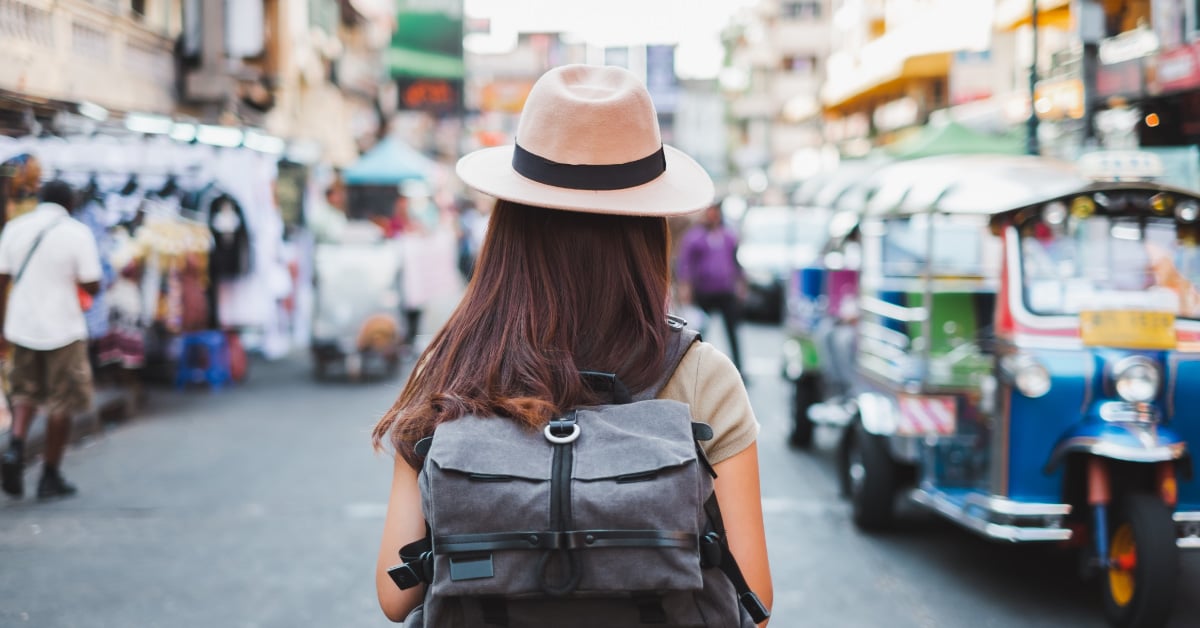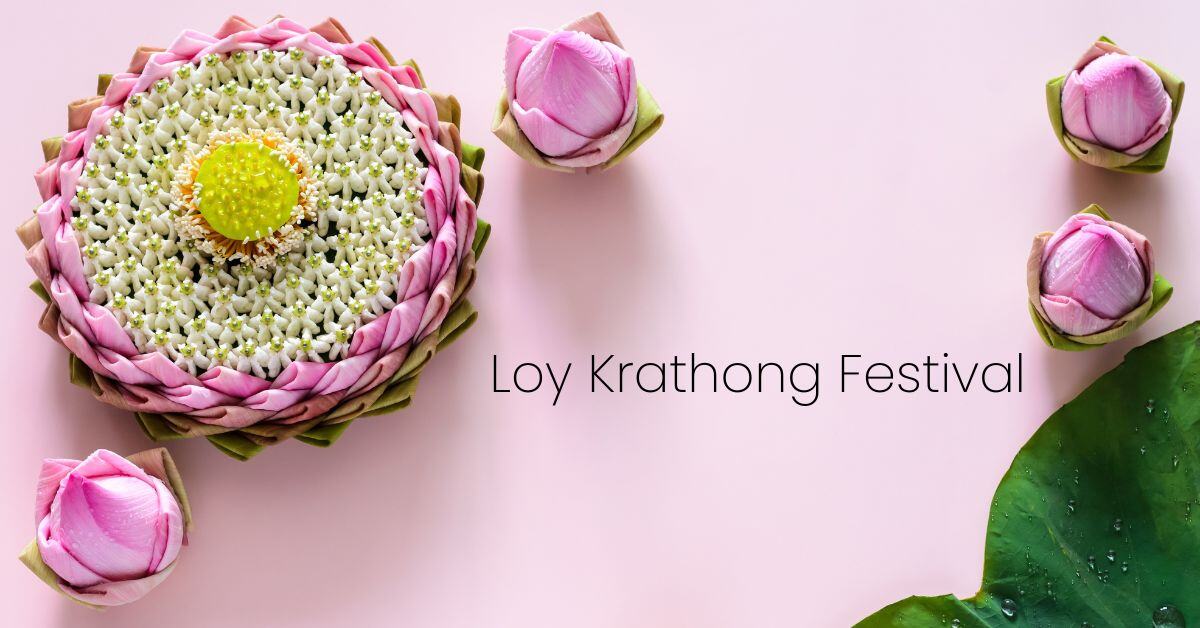Moving Abroad 101: Thailand Edition

Moving abroad for the first time is one of the most exciting things you will ever do in your life. Every day is filled with new discoveries. You’ll see amazing new things, try incredible new foods and make wonderful new friends. The first weeks will feel like the adventure of a lifetime.
Of course, along with the excitement can come some feelings of nervousness. Our Academic Dean always tells our students that how they label this feeling, either calling it nervousness or excitement, changes the way that an individual responds outwardly. As you get ready to move, your adrenaline is pumping. You anticipate the new experiences you’re about to have. You know the experiences will be packed with fun, with surprises, with inspiration, with a new sense of freedom, with expanding horizons, with opening your eyes to what the world has to offer you, with eagerness about all the possibilities that unfold before you.
I still fondly remember all the exhilaration and nervous energy I felt when I was a young aspiring hospitality management professional and moving abroad for the first time. One of the reasons I am so passionate about what I do here at AIHM is because I was once in your shoes and the thing that made a world of difference is the support I received before I made the leap abroad. To make your move smooth and easy, I’d like to offer you some advice to consider as you prepare for the next chapter of your life.

Learn the Basics of Thai Etiquette
If you’re moving to Thailand to study at AIHM (or for any other reason), you’ll find that Thai people are possibly the friendliest in the world. Thailand is an extraordinarily welcoming country—which incidentally makes it a great place to study hospitality. So many people will be happy to help you as you figure out how to do things in a new country. Bangkok’s a very international city too, and many locals will be used to interacting with people who have different backgrounds and social customs. Still, learning the basics of Thai etiquette will contribute a lot to making your transition to life in Thailand smooth and overflowing with positive experiences.

A few tips:
- Thai Greetings
The first must-know is how to greet people in Thai. Being polite and respectful will go a long way. For females, the greeting is “sawatdee ka”, for males “sawatdee krub”. Raise your hands in a ‘wai’ as you say this, placing your palms together in front of your face and bowing your head. (The wai is also used during prayer and when saying thank you.)
- Respect, The Thai Way
It is important to know that Thai people are very protective of the monarchy, and it is illegal to show disrespect. They are also patriotic, playing the national anthem in public places at 8.00 am and 6.00 pm daily: during the anthem, it is customary to stand politely at attention.
- Religion in Thailand
Over 90% of Thais are Theravada Buddhist. Respect of religion and in religious settings is also key in Thai culture, whether to Buddhism or minority religions such as Islam and Christianity. When visiting a temple, keep in mind that you should dress modestly and remove your shoes. Females should not have physical contact with monks.
- Body Language
When sitting, it is customary to sit “mermaid style” with your legs underneath you. Your feet should never be pointed at any person or statue as this is considered disrespectful. This is especially important in temples and other public or formal settings. When in doubt, look to see what other people are doing or ask someone if you are not sure.
Getting Around Bangkok
The BTS skytrain and MRT subway are best for avoiding Bangkok’s notorious traffic. There is usually at least one escalator at each station that takes you to the platform, where you’ll find automatic ticket machines and a manned window where you can get change. You can opt for single fares, or top-up cards which are more convenient.
AIHM is located at the Avani+ Riverside Bangkok Hotel next to sister property Anantara Riverside Bangkok Resort. Anantara’s complimentary shuttle boat departs from the hotel pier regularly, connecting with the BTS at Saphan Taksin. Here, you can also take public river boats which dock at the old town’s major historic sites.

Taxi prices are reasonable in Bangkok, but the time it takes to get around can be consuming. Always take a card from your accommodation that has a map, address and contact number in Thai. Ensure that the driver turns on the metre and have small bills to pay, the will not be able to break a 1000 baht note. The popular Grab ride-hailing app is also available in Thailand and can be very convenient.
Fun Things To Do in Bangkok
Siam Paragon is one of the largest malls in Asia, with international brands, restaurants, cinemas, exhibition halls and an aquarium. The surrounding area is a shopping hot spot and favourite hangout for local students. Getting there is easy; just get off the BTS skytrain at Siam Station, the “Grand Central” of the skytrain system. In the same neighborhood, you’ll find Jim Thompson House, the former home of an American who revived the Thai silk industry. A collection of teak houses displays his personal collection of artefacts.

Chatuchak Weekend Market, or JJ, is the largest market in Thailand, an outdoor sprawl of street fashion, antiques, furniture, art, plants, food and much more. While you can find maps of the market online, the best way to experience JJ is just to get lost in its endless lanes and wander from one intriguing shop to the next.

Many of the Bangkok’s most important historical sites are located in and around an area called Rattanakosin, in a bend of the Chao Phraya River. In the heart of this area, you’ll encounter the Grand Palace complex, which includes a number of glittering temples showcasing traditional Thai design. Its Temple of the Emerald Buddha is the most sacred and revered place in Thailand. Nearby, you’ll also find Wat Pho with its 46-metre-long reclining Buddha and famous murals. In the same area, you can visit the National Museum, which occupies a former palace and holds ancient artefacts from across Southeast Asia. Wat Arun, or the Temple of Dawn, is located on the west bank of the Chao Phraya directly across from Rattanakosin. One of Bangkok’s most iconic sights, Wat Arun’s silhouette is most impressive at dawn and sunset.

Bangkok is filled with parks where you can maintain a healthy lifestyle for little or no cost. However, if you would like to join a gym, we recommend starting with MeetUp.com so you can see which groups offer fitness classes in your area. Jogging by the river is pleasant in the mornings and evenings, and the memorial park beneath the golden Rama IX bridge has well-maintained paths surrounded by greenery. Saranrom Park is located opposite the Grand Palace and occupies the former grounds of Saranrom Palace. The park is dotted with gym equipment, and group exercise classes are often held there.
As you begin to make local friends, you’re sure to find your own favourite spots in the city. Bangkok’s many neighborhoods each have their own personality, things to see and do, and secret hangouts. You could live here for many years and never run out of new discoveries.

What to Pack
Starting university is a big step for anyone, especially if it’s in a new country or city where you may be unsure of the climate and culture. We’ve put together some rough guidelines below.
Three Pieces of Packing Wisdom
- Layers
Pack clothes that can be layered up as the temperature, both outside and inside buildings, is often significantly different.
- Neutral and Versatile
By this, we mean bring classic clothing that can be dressed up or down to suit all occasions.
- Less is more
Go with the basics and accessorise!
Clothing Essentials & Personal Items
The following list is specifically for AIHM students, but most items are useful recommendations for anyone moving to Bangkok.
- 5 days’ worth of professional attire (white shirts, black trousers/skirts, navy-blue necktie, suit and v-neck sweater for men, black socks for men, neutral/black stockings for women)
- 5 days’ worth of casual attire (tops, pants/skirts, light sweaters)
- 1-2 formal suits/dresses
- 1 set of traditional/national attire
- 10 sets of undergarments
- Swim and sports wear
- Sleepwear
- Light coat for rain and wind
- Umbrella and rain boots
- 1 pair of comfortable black leather shoes for practical courses
- 1 pair of dress shoes (closed, single colour, 5-8 cm heels for women)
- 1 set of sports shoes
- 1 pair of flip flops
- Passport, two photocopies, credit and ATM cards
- Laptop, USBs and other digital devices
- Basic stationery
- Small bag or backpack for weekend trips/carrying books, etc.
- Towels, bathrobe and bathmat
- Toiletries and personal grooming items
- Hairdryer and adapter
- First-aid kit
- Prescription medication
- Extra pair of glasses/contact lenses and solution
Of course, Bangkok is home to millions of residents and is one of the world’s best cities for shopping. If you’ve forgotten something or want to purchase a replacement, you’ll probably find yourself spoiled for choice.

Notes for Foodies
Thailand is a foodie paradise, with no shortage of quick, wallet-friendly meals, as well as Michelin-starred international restaurants. Around the Bangkok campus, students can choose from a range of local dining options and international favourites like The Coffee Club, Starbucks and more.

For students who like to cook, shopping for groceries and essentials is easy in Thailand, with affordable options including Big C and Lotus’s, and imported goods to be found at Villa Market and Tops.
As a melting pot of different cultures, you can find cuisines and ingredients from around the world. Vegetarian? Halal? You’ll find a wealth of options. Craving flavours from home? Chances are they won’t be too hard to find in Bangkok. That said, Thai food is some of the best in the world so soon your foodie cravings might be for a flavour-packed tom yam soup, a fragrant iced Thai tea, a fresh papaya salad, or a bowl from your favourite neighborhood noodle shop.
Just for AIHM Students
AIHM’s international students enjoy the support of our Student Affairs team and academic faculty. We know you may be feeling nervous and/or excited so we will support you before, during and after your arrival as you acclimate to a new city, culture and lifestyle. You’ll receive a list of recommended accommodation options near our campus, with choices to fit a variety of budgets and lifestyle preferences. You’re also welcome to take advantage of a special arrival package at Avani+ Riverside Hotel Bangkok with airport transfer and a two-night stay. The AIHM International Student Welcome Webinar gives plenty of tips and guidance as well.

One of the great things about studying abroad in Bangkok is the chance to make friends from Thailand and all over the world. From the AIHM Induction Weekend, you’ll start to get to know your fellow students and make new friends. You’ll also build relationships through your classes, AIHM enrichment activities hosted by Student Affairs, at special events with guest speakers from around the world, and in AIHM clubs created by students for students.
Moving abroad for the first time is an adventure, and AIHM is here to help you make the most of this unforgettable phase of your life!
Want to Know More About Campus Life at AIHM?
Click here to learn more about Campus Life at the Asian Institute of Hospitality Management.


%20(5).jpg)
